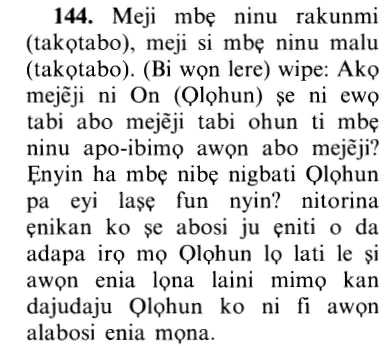6vs144
Select any filter and click on Go! to see results
وَمِنَ الإِبْلِ اثْنَيْنِ وَمِنَ الْبَقَرِ اثْنَيْنِ قُلْ آلذَّكَرَيْنِ حَرَّمَ أَمِ الأُنثَيَيْنِ أَمَّا اشْتَمَلَتْ عَلَيْهِ أَرْحَامُ الأُنثَيَيْنِ أَمْ كُنتُمْ شُهَدَاء إِذْ وَصَّاكُمُ اللّهُ بِهَـذَا فَمَنْ أَظْلَمُ مِمَّنِ افْتَرَى عَلَى اللّهِ كَذِباً لِيُضِلَّ النَّاسَ بِغَيْرِ عِلْمٍ إِنَّ اللّهَ لاَ يَهْدِي الْقَوْمَ الظَّالِمِينَ
Wamina alibili ithnayni wamina albaqari ithnayni qul alththakarayni harrama ami alonthayayni amma ishtamalat AAalayhi arhamu alonthayayni am kuntum shuhadaa ith wassakumu Allahu bihatha faman athlamu mimmani iftara AAala Allahi kathiban liyudilla alnnasa bighayri AAilmin inna Allaha la yahdee alqawma alththalimeena
Index Terms
Click to play
Yoruba Translation

Hausa Translation
Kuma daga rãƙuma akwai nau´i biyu, kuma daga shãnu biyu ka ce: Shin, mazan biyu ne Ya hana ko mãtan biyu Ya hana, kõ abin da mahaifar mãtan biyu suka tattara a kansa? Kõ kun kasance halarce ne a lõkacin da Allah Ya yi muku wasiyya da wannan? To, wãne ne mafi zãlunci daga wanda ya ƙirƙira ƙarya ga Allah, dõmin ya ɓatar da mutãne bã da wani ilmi ba? Lalle ne, Allah bã Ya shiryar da mutãne azzãlumai.
Asbabu n-Nuzuul (Occasions of Revelation)
Allah said,
وَمِنَ الإِبْلِ اثْنَيْنِ وَمِنَ الْبَقَرِ اثْنَيْنِ قُلْ آلذَّكَرَيْنِ حَرَّمَ أَمِ الأُنثَيَيْنِ أَمَّا اشْتَمَلَتْ عَلَيْهِ أَرْحَامُ الأُنثَيَيْنِ ...
And of the camels two, and of oxen two. Say: "Has He forbidden the two males or the two females or (the young) which the wombs of the two females enclose!
... أَمْ كُنتُمْ شُهَدَاء إِذْ وَصَّاكُمُ اللّهُ بِهَـذَا ...
Or, were you present when Allah ordered you such a thing!
mocking the idolators' innovations, and their lies that Allah made sacred what they have prohibited.
... فَمَنْ أَظْلَمُ مِمَّنِ افْتَرَى عَلَى اللّهِ كَذِبًا لِيُضِلَّ النَّاسَ بِغَيْرِ عِلْمٍ ...
Then who does more wrong than one who invents a lie against Allah, to lead mankind astray without knowledge.
Therefore, no one is more unjust than the people described here and
... إِنَّ اللّهَ لاَ يَهْدِي الْقَوْمَ الظَّالِمِينَ ﴿١٤٤﴾
Certainly, Allah guides not the people who are wrongdoers.
The person most worthy of this condemnation is `Amr bin Luhay bin Qum`ah. He was the first person to change the religion of the Prophets and designate the Sa'ibah, Wasilah and Ham, as mentioned in the Sahih.
وقوله تعالى " أم كنتم شهداء إذ وصاكم الله بهذا " تهكم بهم فيما ابتدعوه وافتروه على الله من تحريم ما حرموه من ذلك " فمن أظلم ممن افترى على الله كذبا ليضل الناس بغير علم " أي لا أجد أظلم منه " إن الله لا يهدي القوم الظالمين " وأول من دخل في هذه الآية عمرو بن لحي بن قمعة لأنه أول من غير دين الأنبياء وأول من سيب السوائب ووصل الوصيلة وحمى الحامي كما ثبت ذلك في الصحيح .
"ومن الإبل اثنين ومن البقر اثنين قل آلذكرين حرم أم الأنثيين أم ما اشتملت عليه أرحام الأنثيين أم" بل "كنتم شهداء" حضورا "إذ وصاكم الله بهذا" التحريم فاعتمدتم ذلك ! لا بل أنتم كاذبون فيه "فمن" أي لا أحد "أظلم ممن افترى على الله كذبا" بذلك
" قل آلذكرين حرم " منصوب ب " حرم " " أم الأنثيين " عطف عليه . وما بعده كما سبق .
I'raab - grammatical analysis of the Qur'an
و من الإبل اثنين ، ومن البقر اثنين ... تقدم إعراب ما يشبهها في الآية السابقة.
«أَمِ» حرف عطف بمعنى بل كنتم شهداء.
«كُنْتُمْ شُهَداءَ» كان واسمها وخبرها.
«إِذْ» ظرف زمان متعلق بشهداء.
«وَصَّاكُمُ اللَّهُ بِهذا» فعل ماض تعلق به الجار والمجرور والكاف مفعوله و«اللَّهُ» لفظ الجلالة فاعله. والجملة في محل جر بالإضافة ، وجملة كنتم معطوفة.
«فَمَنْ» الفاء استئنافية. من اسم استفهام مبتدأ و«أَظْلَمُ» خبره والجملة مستأنفة.
«مِمَّنِ» متعلقان باسم التفضيل أظلم.
«افْتَرى عَلَى اللَّهِ كَذِباً» فعل ماض تعلق به الجار والمجرور ومفعوله ، والجملة صلة الموصول لا محل لها.
«لِيُضِلَّ» مضارع منصوب بأن المضمرة بعد لام التعليل والمصدر المؤول من أن والفعل في محل جر باللام لإضلال والجار والمجرور متعلقان بالفعل افترى والفاعل هو.
«النَّاسَ» مفعول به.
«بِغَيْرِ» متعلقان بافترى.
«إِنَّ اللَّهَ» إن ولفظ الجلالة اسمها وجملة «لا يَهْدِي الْقَوْمَ الظَّالِمِينَ» خبرها و«الظَّالِمِينَ» صفة منصوبة بالياء لأنها جمع مذكر سالم وجملة إن اللّه. تعليلية لا محل لها.
